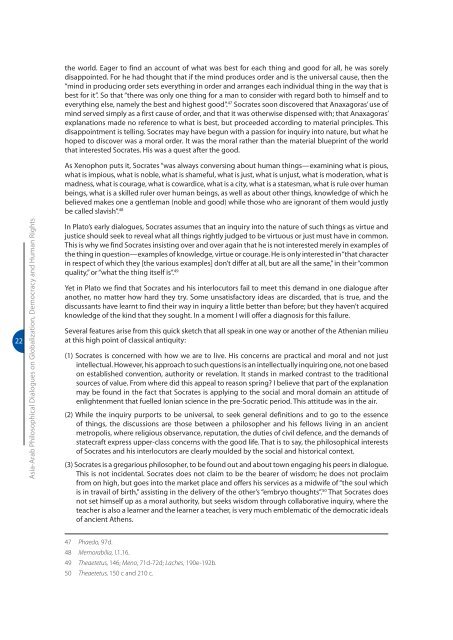Asian-Arab philosophical dialogues on globalization, democracy ...
Asian-Arab philosophical dialogues on globalization, democracy ...
Asian-Arab philosophical dialogues on globalization, democracy ...
You also want an ePaper? Increase the reach of your titles
YUMPU automatically turns print PDFs into web optimized ePapers that Google loves.
22<br />
Asia-<str<strong>on</strong>g>Arab</str<strong>on</strong>g> Philosophical Dialogues <strong>on</strong> Globalizati<strong>on</strong>, Democracy and Human Rights<br />
the world. Eager to find an account of what was best for each thing and good for all, he was sorely<br />
disappointed. For he had thought that if the mind produces order and is the universal cause, then the<br />
“mind in producing order sets everything in order and arranges each individual thing in the way that is<br />
best for it”. So that “there was <strong>on</strong>ly <strong>on</strong>e thing for a man to c<strong>on</strong>sider with regard both to himself and to<br />
everything else, namely the best and highest good”. 47 Socrates so<strong>on</strong> discovered that Anaxagoras’ use of<br />
mind served simply as a first cause of order, and that it was otherwise dispensed with; that Anaxagoras’<br />
explanati<strong>on</strong>s made no reference to what is best, but proceeded according to material principles. This<br />
disappointment is telling. Socrates may have begun with a passi<strong>on</strong> for inquiry into nature, but what he<br />
hoped to discover was a moral order. It was the moral rather than the material blueprint of the world<br />
that interested Socrates. His was a quest after the good.<br />
As Xenoph<strong>on</strong> puts it, Socrates “was always c<strong>on</strong>versing about human things—examining what is pious,<br />
what is impious, what is noble, what is shameful, what is just, what is unjust, what is moderati<strong>on</strong>, what is<br />
madness, what is courage, what is cowardice, what is a city, what is a statesman, what is rule over human<br />
beings, what is a skilled ruler over human beings, as well as about other things, knowledge of which he<br />
believed makes <strong>on</strong>e a gentleman (noble and good) while those who are ignorant of them would justly<br />
be called slavish”. 48<br />
In Plato’s early <str<strong>on</strong>g>dialogues</str<strong>on</strong>g>, Socrates assumes that an inquiry into the nature of such things as virtue and<br />
justice should seek to reveal what all things rightly judged to be virtuous or just must have in comm<strong>on</strong>.<br />
This is why we find Socrates insisting over and over again that he is not interested merely in examples of<br />
the thing in questi<strong>on</strong>—examples of knowledge, virtue or courage. He is <strong>on</strong>ly interested in “that character<br />
in respect of which they [the various examples] d<strong>on</strong>’t differ at all, but are all the same,” in their “comm<strong>on</strong><br />
quality,” or “what the thing itself is”. 49<br />
Yet in Plato we find that Socrates and his interlocutors fail to meet this demand in <strong>on</strong>e dialogue after<br />
another, no matter how hard they try. Some unsatisfactory ideas are discarded, that is true, and the<br />
discussants have learnt to find their way in inquiry a little better than before; but they haven’t acquired<br />
knowledge of the kind that they sought. In a moment I will offer a diagnosis for this failure.<br />
Several features arise from this quick sketch that all speak in <strong>on</strong>e way or another of the Athenian milieu<br />
at this high point of classical antiquity:<br />
(1) Socrates is c<strong>on</strong>cerned with how we are to live. His c<strong>on</strong>cerns are practical and moral and not just<br />
intellectual. However, his approach to such questi<strong>on</strong>s is an intellectually inquiring <strong>on</strong>e, not <strong>on</strong>e based<br />
<strong>on</strong> established c<strong>on</strong>venti<strong>on</strong>, authority or revelati<strong>on</strong>. It stands in marked c<strong>on</strong>trast to the traditi<strong>on</strong>al<br />
sources of value. From where did this appeal to reas<strong>on</strong> spring? I believe that part of the explanati<strong>on</strong><br />
may be found in the fact that Socrates is applying to the social and moral domain an attitude of<br />
enlightenment that fuelled I<strong>on</strong>ian science in the pre-Socratic period. This attitude was in the air.<br />
(2) While the inquiry purports to be universal, to seek general definiti<strong>on</strong>s and to go to the essence<br />
of things, the discussi<strong>on</strong>s are those between a philosopher and his fellows living in an ancient<br />
metropolis, where religious observance, reputati<strong>on</strong>, the duties of civil defence, and the demands of<br />
statecraft express upper-class c<strong>on</strong>cerns with the good life. That is to say, the <str<strong>on</strong>g>philosophical</str<strong>on</strong>g> interests<br />
of Socrates and his interlocutors are clearly moulded by the social and historical c<strong>on</strong>text.<br />
(3) Socrates is a gregarious philosopher, to be found out and about town engaging his peers in dialogue.<br />
This is not incidental. Socrates does not claim to be the bearer of wisdom; he does not proclaim<br />
from <strong>on</strong> high, but goes into the market place and offers his services as a midwife of “the soul which<br />
is in travail of birth,” assisting in the delivery of the other’s “embryo thoughts”. 50 That Socrates does<br />
not set himself up as a moral authority, but seeks wisdom through collaborative inquiry, where the<br />
teacher is also a learner and the learner a teacher, is very much emblematic of the democratic ideals<br />
of ancient Athens.<br />
47 Phaedo, 97d.<br />
48 Memorabilia, I.1.16.<br />
49 Theaetetus, 146; Meno, 71d-72d; Laches, 190e-192b.<br />
50 Theaetetus, 150 c and 210 c.

















